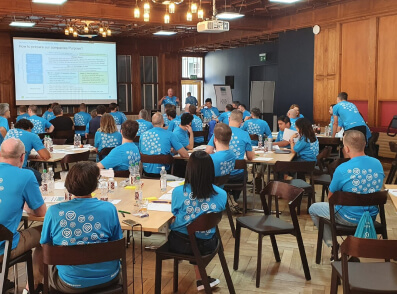Personalization is the key to tailoring products and services to individual preferences based on customer data. This section explores the significance of personalization in recent years, delving into its importance and providing practical examples of its implementation by companies.
What is Personalization? Reasons For Its Importance and Practical Examples
In today’s dynamic landscape, personalization has emerged as a vital strategy to cater to individual needs, driven by the proliferation of customer data and evolving consumer expectations. This article offers an in-depth exploration of personalization, elucidating its benefits and crucial role in contemporary business practices. Additionally, it provides real-world examples of companies effectively employing personalization strategies.
Personalization: Tailoring Customer Experiences
At its core, personalization involves analysing customer data to customize products and services for everyone. By leveraging insights into customer attributes and behavior, companies aim to enhance the overall customer experience and satisfaction. For instance, the ‘Recommendations For You’ feature on e-commerce platforms is a testament to personalization, where consumer preferences gleaned from purchase and browsing history inform tailored content.
Differences with Customisation
While often conflated, personalization and customization are distinct approaches. Personalization entails companies tailoring offerings based on customer data, whereas customization involves customers selecting products or services according to their preferences.
Why Personalization is Important

The emphasis on personalization stems from several factors shaping contemporary consumer dynamics.
Diversification of Customer Needs and Values
In the age of information abundance, consumers are inundated with choices, leading to diversified needs and preferences. To drive sales and enhance customer satisfaction, businesses must provide tailored solutions that resonate with individual customers.
Diversification of Promotion Methods
With the rise of digital channels and social media, traditional mass marketing approaches have given way to personalized promotional strategies. Companies now rely on tailored content and targeted advertisements to engage customers across various platforms.
Limitations of Traditional Promotion
Traditional promotional methods, such as target personas and customer journey maps, are limited in their ability to address individual needs. Personalization offers a solution by enabling tailored responses to diverse customer requirements.
Benefits of Personalization
The adoption of personalization yields numerous benefits for businesses.
Improved Promotion Efficiency
Personalization streamlines promotional efforts by delivering targeted messages to individual customers. Leveraging digital tools, companies can automate this process, thereby enhancing efficiency and resource allocation.
Increased Customer Satisfaction
Personalization enhances customer satisfaction by providing bespoke experiences tailored to individual preferences. By offering personalized content and services, businesses can foster loyalty and encourage repeat business.
Acquisition of Potential Customers
Personalization enables businesses to attract new customers by addressing latent needs and offering tailored solutions. Building long-term relationships with these customers can lead to sustained sales growth.
Three Important Data Points for Personalization
To implement personalization effectively, companies must leverage key data points to understand customer preferences.
Context (Customer Environment)
Contextual information provides insights into the customer’s environment, enabling timely and relevant interactions. By analyzing data such as device usage and location, businesses can deliver targeted messages to capture customer attention.
Demographics (Customer Attributes)
Demographic data, including age and gender, enhances the accuracy of personalized offerings. By collecting and analyzing this information, businesses can better understand their customer base and tailor products and services accordingly.
Behavior (Customer Behavior Data History)
Behavioral data offers valuable insights into customer preferences and purchase history. By analyzing browsing and purchase behavior, businesses can identify patterns and recommend relevant products to individual customers.
Points to Bear in Mind When Carrying Out Personalization

Implementing personalization requires careful consideration of ethical and operational factors.
Handling of Personal Data
The collection and analysis of customer data must be conducted with utmost care to ensure data security and compliance with regulations. Transparency regarding the use of personal data is essential in order to maintain customer trust.
Check for Bias in the Information Provided
It is crucial to ensure that personalized communications are not biased, and accurately reflect customer preferences. Regular review and updating of information can help mitigate bias and ensure relevance.
Understanding Your Company’s Services and Products
A deep understanding of company offerings is essential for effective personalization. Tailoring promotions to diverse customer segments requires insight into product suitability and value propositions.
Regular Review of Settings
Continuous review and adjustment of personalization settings are necessary to adapt to changing customer preferences and market dynamics. Staying abreast of new developments ensures the continued effectiveness of personalization strategies.
Examples of Personalization in Practice
Several companies have successfully implemented personalization strategies to drive customer engagement and loyalty.
Amazon: Recommendation Function Using Big Data
Amazon’s recommendation engine analyzes customer data to suggest relevant products based on past behavior. This personalized approach enhances the shopping experience and encourages repeat purchases.
Google: Personalized Search Engine
Google’s personalized search feature delivers tailored search results based on user history, improving search relevance and user experience. Users have the option to disable personalization for greater control over search results.
Starbucks Coffee: Recommendation Function Using User Behavior History
Starbucks’ mobile app employs personalization to offer customized recommendations and incentives based on user behavior. By leveraging customer data, Starbucks enhances engagement and loyalty among its customer base.
Use Tools to Implement Personalization Tactics

To effectively implement personalization strategies, it is crucial to use a system that is adept at seamlessly gathering and analyzing contextual, demographic, and behavioral data. For streamlined collection and analysis of such intricate customer insights, we recommend leveraging the “dacadoo Digital Health Engagement Platform (DHEP).” Developed with the use of 400 million life-years of health data and boasting over a decade of operational experience, dacadoo DHEP stands as a robust enterprise software trusted by global organizations, all united by a common concern for human health.
This platform offers exceptional scalability and the capability to integrate diverse functionalities, designed to entice users to actively engage with the application. Among its standout features are the Health Score for instant health assessments, goal-setting functions to drive progress, and a rewarding system to enable users to accrue points for redemption. By empowering users with an array of engaging features, companies can not only foster greater user involvement but also extract comprehensive user insights, including health preferences, medical histories, and exercise habits.
For instance, businesses can leverage the dacadoo DHEP to tailor solutions to specific customer segments, such as recommending insurance products suited to demographics such as “35-45 year-old health conscious individuals with a high quality of life, history of illness, and concerns about their future well-being.”
Crucial to personalization is the responsible handling of personal data. Rest assured, dacadoo adheres to stringent data protection and privacy regulations, including the EU General Data Protection Regulation (GDPR), the Health Insurance Portability and Accountability Act (HIPAA), and updated Data Protection Acts. Our commitment to safeguarding your data is underpinned by certifications and management systems, including ISO/IEC 27001:2013 for Information Security Management and ISO/IEC 27701:2019 for Privacy Information Management.
Keen to explore dacadoo DHEP firsthand? Request a demo today. If you’re contemplating integrating personalized apps for your users, reach out to dacadoo for learning more about our solutions.













